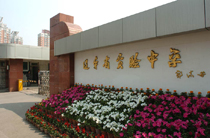随着我国教育由应试教育走向素质教育,外语教学的目的也越来越突出培养学生的外语交际能力,基于这一点,我做了一次大胆的尝试。把《九年义务教育初级中学英语教科书》第二册第16单元第61课的教学从教室里拉到了操场上,以活动课的形式完成对话课的教学内容。主要设计思路如下:
(一) 将本地区的行政区图画在操场上,给学生以耳目一新的感受,激发学生的学习兴趣和参与欲望。
(二) 多种情景的创设能够培养学生的创造性思维能力。
(三) 形式多样的练习能够促进学生交际能力的发展。真正达到学以致用的目的。
具体操作步骤如下:
步骤一:用以旧带新的方法,引导学生回忆学过的问路、指路的表达方法,在此基础上引入新的语言点,使学生即巩固了旧知识又学了新内容。
问路: Excuse me, where is … ?
How can I get to … ?
Which is the way to …, please?
Could you tell me how I can get to …, please?
Which bus can take me to … ?
I want to go to …, can you show me the way?
Can you tell me the way to … ?
指路: It’s over there. ( between … and … )
( at the end of the street )
(next to … )
(opposite the … )
Go along (down; up ) this road and …
Go across the bridge and …
Turn left (right ) at the … crossing and …
Take the … turning on the left (right ), and then …
Take the No.…Bus and it’ll take you to …
It’s very far from here, You’d better take a taxi.
步骤二:创设情景,分组练习。
1:两人一组练习,以图中标志(1)为起点。
1) 某位同学要去购物中心买文具
A: Hello. I want to go to the Shopping Centre to buy a pen, My pen is broken.
Will you go with me?
B: Sorry. I haven’t finished my homework.
A: But I don’t know the way, can you tell me?
B: Ok. Go out of the school gate, turn right, go down that road, at the second
Crossing you can see it on your right.
A: Thank you.
B: You’re welcome.
2) 放学了,刚出校门,有人向你询问去火车站的路。
A: Excuse me, which is the way to the Railway Station?
B: Go along this road, take the second turning on the left. Then go down that
street, you’ll find the Railway Station at the end of it.
A: How nice you are. Thank you very much.
B: That’s all right.
3) 田径队的同学要去体育场训练,请指路。
4)某同学突患疾病,需要去医院就医,请指路。
5)老师要去张店一中听课学习,请指路。
6)韩梅同学是个爱学习的学生,放学后她要去新华书店买书,请指路。
以上4组对话内容略。
2:多人问一人答练习。
在中心路和新村路交界处有一个交警在值勤,他热情地为来往客人指路。
在图中标志(2)处。
1) 问去淄博饭店的路。
A: Excuse me, can you tell me the way to Zi Bo Restaurant?
B: Yes. Go down this road, when you get to the second crossing, you’ll find it’s in
front of you on the right. You won’t miss it.
A: Thanks a lot.
B: It’s a pleasure.
2) 问去和平小区的路。
A: Excuse me, How can I get to He Ping Living Area?
B: Let me see, Oh, go up this road, turn left at the second crossing, then take the
First turning on the right. It’s a little far from here. It’ll take you half an hour to
Walk there. You may take a taxi.
A: It’s very kind of you. Thank you very much.
B: You’re welcome.
3) 问去淄博五中的路。
4)问去长途汽车站的路。
5)问去人民公园的路。
6)问去淄博铁中的路。
以上4组对话内容略。
3:小组活动。每一位小组成员都要参加,位置自选。
1)一位英国人要到山东理工大学任教,由于她非常想了解中国,所以她比原计
划早一天来到淄博,下了火车以后没有人接她,她只好一路询问。
A: Excuse me, where’s the ShangDong Science and Engineering Institute please?
B: Sorry, I’m new here.
A: Thank you all the same.
A: Excuse me, can you tell me how I can get to the Science and Engineering Institute, please?
C: It’s very far. You may take the No. 2 Bus. It’ll take you there.
A: But I want to know something more about ZiBo. I don’t want to take a bus.
Please show me the way, OK?
C: OK. Go along this street, turn left when you see ZiBo Restaurant, then walk along
that road, after three crossing you can see it on your right.
A: Thank you very much.
C: That’s OK.
A: Oh, dear! Where am I? I should ask another people. Excuse me, could you tell me
the way to the Science and Engineering Institute, please?
D: Sorry, I don’t know. You’d better ask the policemen.
A: Thanks a lot.
A: Excuse me, How can I get to the Science and Engineering Institute, please?
E: Go along this road, you can find it on your right at the second crossing. It’s about
ten minutes’ walk. You can’t miss it.
A: Thank you very much.
E: Not at all. Good-bye.
A: Bye.
2) 一个年轻人到淄博做工。不慎受伤。他的妈妈知道后从外地赶来看望儿子。从长途汽车站下车,她就打听去中心医院的路,经多方询问终于找到了她的儿子。
3)星期天,三组的同学们要去看电影,其中有一个同学是新来的,他不知到去电影院的路,于是他给同学打电话询问,然后按同学告诉他的路线去了电影院。
4)张林是位新同学,他要给原学校的同学寄信,但不知到去邮政局的路,他只好一路询问。
5)过春节大家收到了好多压岁钱,他们都不舍得花,决定存入银行。他们从各自的家中出发,分别询问去银行的路。
以上4组对话内容略。
4:发挥各自的想象力,自由结伴练习。
步骤三:自由练习结束后,简单总结归纳,然后宣布下课,全课结束。
课后小结:大胆的尝试取得了令人满意的效果,达到了预期的目的。实践证明,改变单一的课型模式,走出教室,为学生创造轻松愉快的学习环境,有利于巩固学生的学习兴趣,提高实际运用英语的能力。尤其是自由结伴练习激发了所有同学的参与积极性,大家都充分发挥了自己的想象力,就连平时上课很少发言的同学也跃跃欲试。同学们普遍反映这堂课有真实感,令他们终生难忘。










